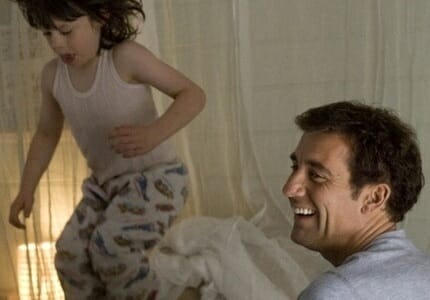
Release Date: Oct. 9
Director: Scott Hicks
Writer: Alan Cubitt
Starring: Clive Owen
Cinematographers: Greg Frasier
Studio/Run Time: Miramax Films/104 mins.
A detailed and often frustratingly realistic rumination on loss, family
Though the title of Clive Owen’s new drama, The Boys Are Back, brings to mind something cheeky that’d likely star Steve Martin, the film is anything but—beautifully shot, wonderfully rich and superbly acted. The story is not altogether unfamiliar: after his second wife dies, Joe (Owen) is left to piece back together some semblance of a life for he and his sons. But that’s where the banalities end, as The Boys Are Back thrives not on its plot points, but on perfectly human character studies so relatable that, at times, they’ll make the audience cringe from uncomfortable familiarity.
The centerpiece of the film is the interconnectedness of the three boys: sportswriter Joe; Artie (Nicholas McAnulty), Joe’s second-marriage son who is just shy of being old enough to understand the gravity of his mother’s death; and Harry (George MacKay), Joe’s first son whom, along with first wife, he abandoned in England to chase new love Katy (Laura Fraser) to Australia.
Director Scott Hicks (Shine) makes the most of the setting: The grassy, seaside hills of South Australia are not only delicious eye candy, but bolster the film’s subdued mood of isolation. The wind is always blowing; Joe’s car is always alone on the road. Sigur Rós’ lush atmospheric music only escalates the effect.
Joe, doubly overwhelmed when his ex-wife sends Harry to live with him and Artie, is a hard character to like; he’s irresponsible, often childish and cocky, quickly adopting a “Just Say Yes” parenting mantra that he seems to truly believe, even when his household begins to look like a child’s treefort. The three grow and learn not only from, but about each other. Artie’s boyish wonder conflicts with the too-heavy reality that mama is not coming home. Harry tries to cope with abandonment—the fact that his father didn’t just leave his mother, he left him.
We want to see Joe grow into his roll as a father, but his progress is frustratingly incremental. When he tells Harry, after foolishly and nearly tragically leaving his kids home alone, that he won’t scare him again, we simply don’t believe him. The success of The Boys Are Back lies in our frustration with Joe—he’s a flawed protagonist, trying hard to grow but never hard enough. The film offers no easy answers, and, though hopeful, its realism assures us that things will go wrong. And that’s what makes the film so right.